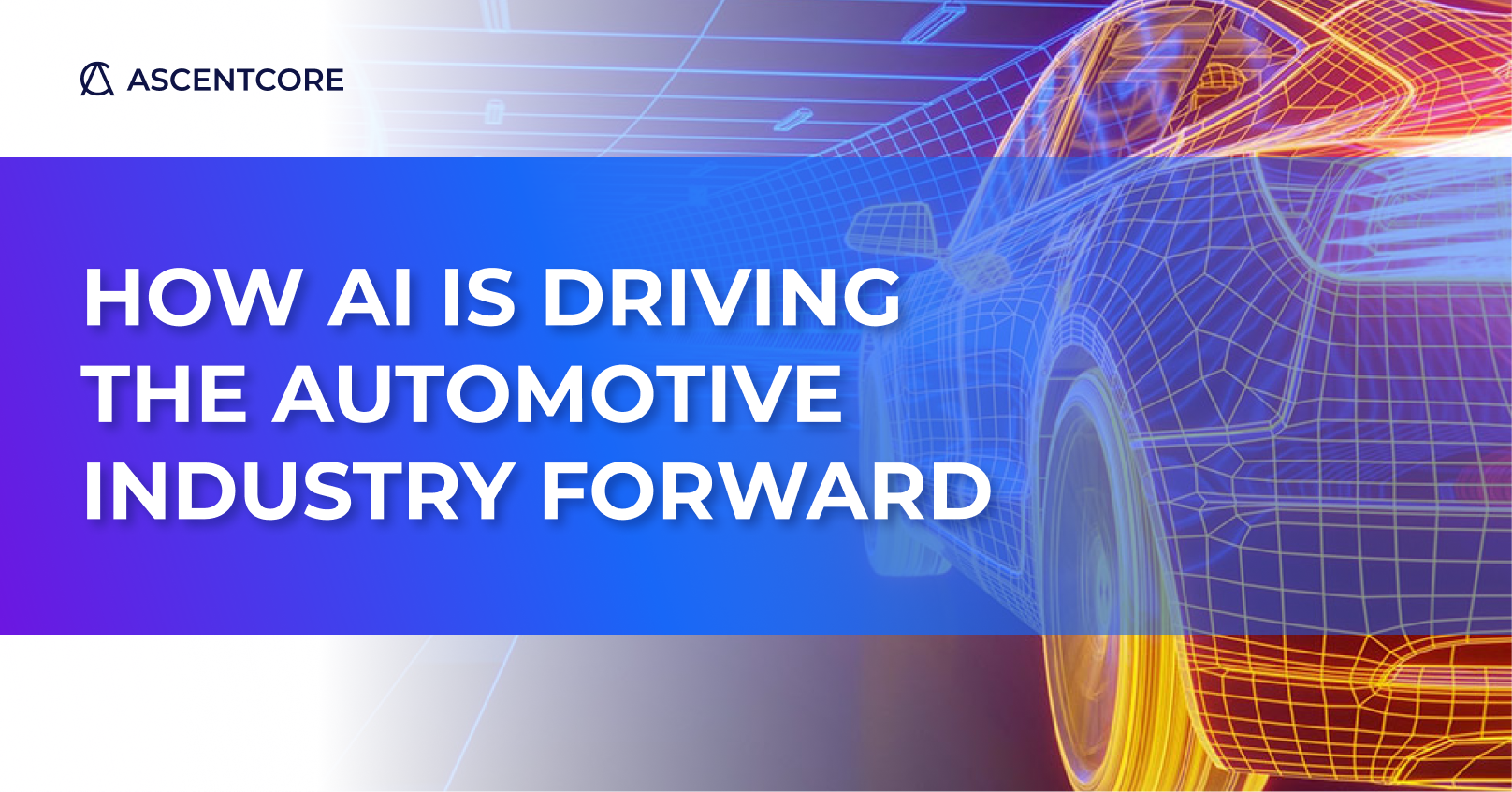When we think about the future of the automotive industry, images of flying and autonomous cars usually come to mind. And while flying cars may still be in the realm of science fiction, the industry has made significant technological advances, largely due to leveraging the power of AI.
AI technology has revolutionized various aspects of the industry, from vehicle manufacturing to operations, to the customer experience. Keep reading as we dive into a few key ways AI influences the automotive industry and a few challenges to be aware of.
AI: Driving the Automotive Industry Forward
Safety and maintenance. AI plays a crucial role in keeping autonomous vehicles safe and providing driver assistance and maintenance for cars with human drivers.
- Advanced Driver Assistance Systems (ADAS): AI powers ADAS features such as lane departure warnings, adaptive cruise control, and automatic emergency braking. These systems use AI algorithms to analyze sensor data and assist drivers in avoiding accidents, improving overall vehicle safety.
- Predictive Maintenance: AI can monitor various vehicle components and predict when maintenance or repairs will be required. By analyzing sensor data, AI can identify patterns and detect anomalies that may indicate potential failures. This predictive maintenance approach helps prevent breakdowns and improves the reliability and efficiency of vehicles.
- Enhanced Safety: AI algorithms can analyze data from various sources, such as traffic cameras and sensors, to detect and predict potential accidents or hazardous situations. This information can be used to alert drivers or even trigger automatic safety features in the vehicle, improving safety conditions for everyone on the road.
Entertainment and information. Whether using GPS, making phone calls, or selecting a playlist for a road trip, AI can make our car rides much more entertaining while also allowing for safer driving.
- Natural Language Processing (NLP): AI-powered voice assistants like Apple’s Siri, Amazon’s Alexa, or Google Assistant are increasingly integrated into vehicles, allowing drivers to control various functions using voice commands. NLP technology enhances the in-car user experience by enabling hands-free interaction with navigation, entertainment systems, and other features.
- Enhanced Infotainment Systems: AI enhances infotainment systems by personalizing the user experience based on individual preferences and behavior patterns. AI algorithms analyze user data to suggest personalized music playlists, recommend nearby restaurants, and provide real-time traffic updates.
Manufacturing and internal processes. AI doesn’t only enhance the driving experience – it can improve processes for manufacturers as well.
- Virtual Prototyping and Simulation: AI enables virtual prototyping and simulation, allowing automakers to design and test vehicles in a virtual environment before physical production. This saves time and resources, enabling the manufacturers to refine designs and optimize performance.
- Supply Chain Optimization: AI can optimize the automotive supply chain by analyzing vast amounts of data to identify patterns, forecast demand, and optimize inventory management. AI algorithms help automakers streamline production processes, reduce costs, and improve efficiency.
AI Presents Opportunities… and Challenges
Leveraging the power of AI undoubtedly offers the automotive industry opportunities to improve processes and meet customer expectations, but it’s not without its pitfalls. Addressing these challenges will require collaboration among various stakeholders, including automakers, regulators, researchers, and technology providers. Overcoming these hurdles will be instrumental in harnessing the full potential of AI in the automotive industry while ensuring that safety, privacy, and ethical considerations are appropriately addressed.
- Data privacy and security: Cars equipped with AI technology generate a massive amount of data, including personal and sensitive information. Ensuring the privacy and security of this data is crucial to maintaining customer trust and protecting against cyber threats and unauthorized access to vehicle systems.
- Safety and liability: As AI takes on more control in autonomous vehicles, ensuring the safety of everyone on the road becomes critical. Developing AI algorithms that can handle unpredictable situations, make ethical decisions, and minimize accidents is complex and poses some legal and ethical challenges.
- Regulatory and legal frameworks: The rapid advancement of AI in the automotive industry has outpaced the development of regulations and legal frameworks. Establishing standardized guidelines, safety protocols, and liability frameworks to govern AI-driven vehicles and their interactions with other road users is a challenging task and one that can’t be ignored.
- Ethical considerations: AI systems in vehicles often face ethical dilemmas, such as making split-second decisions that may impact human lives during critical situations. Determining the ethical principles and guidelines for AI systems to follow in these scenarios requires careful consideration and transparency when training AI algorithms.
AI Is Here to Stay
AI technology has revolutionized our lives, from how we communicate to how we drive (or don’t) our cars. Artificial Intelligence is shaking up the automotive industry, whether it’s enhancing the safety and maintenance of vehicles or optimizing internal processes and the supply chain. And AI isn’t going away anytime soon, so it will be necessary for the industry to understand and mitigate the challenges that this technology presents.
If you’re curious to learn how AI technology could help your business, reach out to AscentCore. With a focus on AI and ML, we deliver transformational results for our clients by leveraging the latest technology and empowering companies to disrupt, transform, accelerate, and scale.














